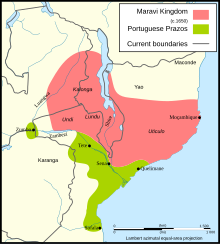| Revision as of 08:04, 19 May 2014 editMoswento (talk | contribs)Autopatrolled22,891 edits Disambiguated: Luangwa → Luangwa River← Previous edit | Revision as of 11:12, 19 December 2014 edit undo41.56.63.230 (talk) I came upon this information from an elderly man from Mpumalanga in South Africa who, unfortunately, died in 2012. <ref></ref>Tag: extraneous markupNext edit → | ||
| Line 1: | Line 1: | ||
| ] | ] | ||
| '''Maravi''' was a |
'''Maravi''' was a kingdom established by ] and straddled the current borders of Malawi, Mozambique and Zambia, in the 16th century. The present-day name "Malawi" is said to derive from "Maravi" which itself means "fire flames". | ||
| At its greatest extent, the state included territory from the ] and Tonga areas to the north to the ] in the south, and west to ] and ] valleys. ] belonged to the |
At its greatest extent, the state included territory from the ] and Tonga areas to the north to the ] in the south, and west to ] and ] valleys. ] belonged to the Mwale ] and held the title ]. They ruled from ], the secular/administrative capital, and were the driving force behind the state's establishment. Meanwhile, the patrilineal Banda clan, which traditionally provided healers, sages and metallurgists, took care of religious affairs from their capital ] near ]. | ||
| After contact with the ], trade intensified. It included such items as beads of the ] type and ] ] imported via Portuguese intermediaries. In the 19th century, the state declined and the Maravi were frequently raided by their neighbors the ] and captured for sale as ]. ] visited Lake Nyasa in 1859, and ] missionaries soon followed. | After contact with the ], trade intensified. It included such items as beads of the ] type and ] ] imported via Portuguese intermediaries. In the 19th century, the state declined and the Maravi were frequently raided by their neighbors the ] and captured for sale as ]. ] visited Lake Nyasa in 1859, and ] missionaries soon followed. | ||
| "Maravi" is therefore a general name of the peoples of |
"Maravi" is therefore a general name of the peoples of Malawi, Zambia, Mozambique and the eastern part of Zimbawe. Chewa, which is also referred to as Nyanja and is the official language of Malawi and Zambia and to some extent Mozambique, is the language that emerged from this Sotho empire and this can be seen by its similarity to Sepedi (Northern Sotho) that is spoken in south Africa as well as the surnames of the Nyanja people - which reflect this Sotho ancestry. | ||
| However, what is interesting to note is that Chewa or Nyanja is not an original language. It is a language that contains a number of Bantu languages. Though its foundation is Sotho, it has, however, taken up a lot of Zulu and has been influenced by such languages as Shangaan, <ref></ref>Shona, Tumbuka, and Tonga.] in Mozambique and ] in Malawi, Zambia, and Zimbabwe. | |||
| ==See also== | ==See also== | ||
Revision as of 11:12, 19 December 2014

Maravi was a kingdom established by ] and straddled the current borders of Malawi, Mozambique and Zambia, in the 16th century. The present-day name "Malawi" is said to derive from "Maravi" which itself means "fire flames".
At its greatest extent, the state included territory from the Tumbuka and Tonga areas to the north to the Lower Shire in the south, and west to Luangwa and Zambezi valleys. Maravi's rulers belonged to the Mwale matriclan and held the title Kalonga. They ruled from Manthimba, the secular/administrative capital, and were the driving force behind the state's establishment. Meanwhile, the patrilineal Banda clan, which traditionally provided healers, sages and metallurgists, took care of religious affairs from their capital Mankhamba near Nthakataka.
After contact with the Portuguese, trade intensified. It included such items as beads of the Khami type and Chinese porcelain imported via Portuguese intermediaries. In the 19th century, the state declined and the Maravi were frequently raided by their neighbors the Yao and captured for sale as slaves. David Livingstone visited Lake Nyasa in 1859, and Protestant missionaries soon followed.
"Maravi" is therefore a general name of the peoples of Malawi, Zambia, Mozambique and the eastern part of Zimbawe. Chewa, which is also referred to as Nyanja and is the official language of Malawi and Zambia and to some extent Mozambique, is the language that emerged from this Sotho empire and this can be seen by its similarity to Sepedi (Northern Sotho) that is spoken in south Africa as well as the surnames of the Nyanja people - which reflect this Sotho ancestry.
However, what is interesting to note is that Chewa or Nyanja is not an original language. It is a language that contains a number of Bantu languages. Though its foundation is Sotho, it has, however, taken up a lot of Zulu and has been influenced by such languages as Shangaan, Cite error: There are <ref> tags on this page without content in them (see the help page).Shona, Tumbuka, and Tonga.Portuguese in Mozambique and English in Malawi, Zambia, and Zimbabwe.
See also
External links
This African history–related article is a stub. You can help Misplaced Pages by expanding it. |
This Malawi-related article is a stub. You can help Misplaced Pages by expanding it. |
This Mozambique-related article is a stub. You can help Misplaced Pages by expanding it. |